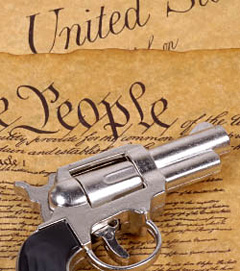
|
 |
 |
 Editorials | Opinions | March 2008 Editorials | Opinions | March 2008  
Do We Really Have a Right to Bear Arms?
 Ben Boychuk & Joel Mathis - RedBlueAmerica.com Ben Boychuk & Joel Mathis - RedBlueAmerica.com
go to original


| | For the first time in 70 years, the U.S. Supreme Court is entering the controversy over whether individuals have the right to keep and bear arms under the Second Amendment. | | |
For the first time in 70 years, the U.S. Supreme Court is entering the controversy over whether individuals have the right to keep and bear arms under the Second Amendment.

That question, which the justices heard argued Tuesday, is at the heart of a debate about how much power the government has to regulate gun ownership. The high court will likely decide by June whether Washington, D.C.'s strict, three-decade-old ban on handguns is constitutional. A lower court tossed out the ban last year.

Should the justices affirm the individual right to own guns? Or should cities have the power to ban guns in order to fight crime? Ben Boychuk and Joel Mathis, the moderators of RedBlueAmerica.com, weigh in.

Ben Boychuk:

The Bill of Rights is a beautiful document. But how odd is it that out of 10 amendments enumerating individual rights, one amendment should be an exception? The First Amendment guarantees an individual's right to assemble, speak and worship as he chooses. The Fourth Amendment bars government from searching an individual's home without a warrant. The Fifth Amendment guarantees an individual's right to a fair trial.

But the Second Amendment is a "collective right" that has nothing whatsoever to do with an individual's right to protect himself, his property or his community? Strange.

That's not to say government cannot place reasonable limits on who can own a gun or what kind of weapons an individual should own. But the framers of the Constitution well understood that gun ownership wasn't simply about plinking cans or hunting for sport.

"The Constitution shall never be construed to prevent the people of the United States who are peaceable citizens from keeping their own arms," Samuel Adams said.

"I ask, sir, what is the militia?" George Mason asked. His answer: "It is the whole people ... To disarm the people is the best and most effectual way to enslave them."

"The great object is that every man be armed," Patrick Henry said. "Every one who is able may have a gun."

Wise men, those framers. Here's hoping five Supreme Court justices are as wise.

Joel Mathis:

There probably are five votes on the Supreme Court to declare an individual right to gun ownership. That's hardly surprising: Even liberal legal scholars such as Lawrence Tribe concede - reluctantly, to be sure - that the Second Amendment guarantees such a right.

But that doesn't end the discussion. There is no such thing as an unfettered freedom. Oliver Wendell Holmes famously observed that the First Amendment doesn't give Americans the right to shout "Fire!" in a crowded theater. It is well understood that individual rights must be balanced against public safety, even if we often battle over where those lines must be drawn. Guns - which have no other function than to kill or injure - shouldn't be an exception to this rule.

The D.C. ban, in fact, does try to strike a balance along these lines. It prohibits possession of machine guns, sawed-off shotguns and handguns. That leaves rifles and regular shotguns, which are useful in hunting and home defense - but which aren't exactly the weapons of choice on the streets of our nation's crime-ravaged capital. This seems reasonable.

Conservatives argue that the Second Amendment shouldn't be interpreted more restrictively than others in the Bill of Rights. Perhaps. But neither should it be interpreted less restrictively. The D.C. handgun ban should stand. | 
 | |
 |



